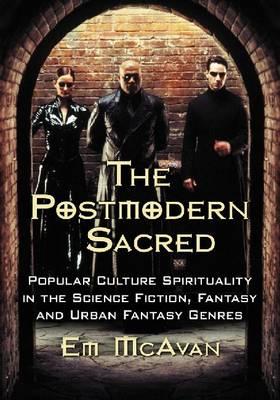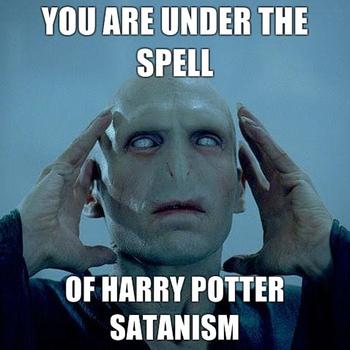 Emily McAvan has been on my radar since I first encountered her research in the sacred aspects of science fiction and fantasy. She teaches cultural, media and gender studies at Murdoch University and Curtin University, both in Perth, Australia. In the interview that follows we discuss aspects of her fine book The Postmodern Sacred: Popular Culture Spirituality in the Science Fiction, Fantasy and Urban Fantasy Genres (McFarland, 2012). (You can learn more about that book and many other fine volumes and other items in the TheoFantastique Store.)
Emily McAvan has been on my radar since I first encountered her research in the sacred aspects of science fiction and fantasy. She teaches cultural, media and gender studies at Murdoch University and Curtin University, both in Perth, Australia. In the interview that follows we discuss aspects of her fine book The Postmodern Sacred: Popular Culture Spirituality in the Science Fiction, Fantasy and Urban Fantasy Genres (McFarland, 2012). (You can learn more about that book and many other fine volumes and other items in the TheoFantastique Store.)
TheoFantastique: Emily, thank you for your time in discussing your book. I have enjoyed your work in this area and was glad to see your fine research come out in book form. Can you briefly define what you mean by “the postmodern sacred,” and how our “terminal identity” plays a part in forming this?
Emily McAvan: What I was really getting at in naming the postmodern sacred is the virtualisation of religious belief and practice in the digital world. With the proliferation of virtual technologies, ever present internet connections, right in the palm of our hand or in our laps, there’s a sense that these form what Scott Bakutman called “terminal identities.” Identity is produced, mediated by, both the kinds of content available and the way it’s delivered, which for me has an impact on the way we experience religion today.
I set out to explore those through a variety of media texts, particularly science fiction and fantasy, terming them collectively as the postmodern sacred because of the religious implications of the stories these texts are telling.
TheoFantastique: How does the postmodern sacred adopt a particular epistemology in relation to those of “real world” religions, and how might this inform clashes from certain religious segments of society over expressions of the postmodern sacred such as those in the past over Harry Potter?
 Emily McAvan: In terms of epistemology, way of knowing, the postmodern sacred takes a kind of syncretic approach, pulling together signifiers from various traditions without having any master ideology. Quite naturally, this upsets people who want to maintain their singular purchase on truth. The interesting thing with Harry Potter is, okay it’s a representation of witchcraft on the page and the screen, and yes the Bible says not to suffer a witch. So what? It’s fiction. So why the conflict? The answer I think is that fiction is a way of telling truth slant, to quote Emily Dickinson. Harry Potter gives a little too much life to witchcraft, fires the imagination a little too much, for the comfort of some people.
Emily McAvan: In terms of epistemology, way of knowing, the postmodern sacred takes a kind of syncretic approach, pulling together signifiers from various traditions without having any master ideology. Quite naturally, this upsets people who want to maintain their singular purchase on truth. The interesting thing with Harry Potter is, okay it’s a representation of witchcraft on the page and the screen, and yes the Bible says not to suffer a witch. So what? It’s fiction. So why the conflict? The answer I think is that fiction is a way of telling truth slant, to quote Emily Dickinson. Harry Potter gives a little too much life to witchcraft, fires the imagination a little too much, for the comfort of some people.
TheoFantastique: Some scholars have argued previously that at times the experience of film may approximate a religious experience. In your book you take this further and argue that the process of consuming religiously- or spiritually-inflected texts is a form of spiritual experience. How is this so, and how does it relate to more traditional expressions of religiosity? Also in connection with this, how are these encounters with the postmodern sacred in media forms of “second-hand experience of transcendence and belief?”
Emily McAvan: Well, one of the main differences from traditional religious practice is that there’s no communal expectations involved really, no institutions forming. There’s no priests or rabbis. It’s not there’s no ties there – popular culture fandoms definitely create bonds between people – but not to the same degree, not the birth, life, wedding stuff for the most part. This is why I call the postmodern sacred a supplement, an addition and replacement in the Derridean sense. It adds to, and displaces.
But at the same time, of course a text that is drawing on Christianity or Buddhism or whatever for its symbolic power is always a degree removed from the intensity of religious mystic experience. The numinous, as Rudolph Otto termed supernatural elements, is onscreen, it’s not with you.
 TheoFantastique: You note that the postmodern sacred is willing to play with the sacred. Is it this element, perhaps through a willingness to go so far as to play in ways that threaten to transgress conceptions of the traditional sacred that make it so appealing to the postmodern mindset?
TheoFantastique: You note that the postmodern sacred is willing to play with the sacred. Is it this element, perhaps through a willingness to go so far as to play in ways that threaten to transgress conceptions of the traditional sacred that make it so appealing to the postmodern mindset?
Emily McAvan: It absolutely is. It can combine, recombine, religions in fairly plastic ways. In that sense, it’s transgressive and indeed pleasurable. Rather than stake out a single religious tradition, it’s perhaps easier – and definitely more profitable – to play with disparate signifiers.
TheoFantastique: In your chapter on “Virtual Religion” you note that the postmodern sacred “temporarily suspend(s) the ‘rational’ laws of the universe that prohibit Gods and monsters from existence.” Does this represent a curious mix of the embrace of an Enlightenment rationalist metanarrative along with a postmodern skepticism of metanarratives, which is then applied to Gods and monsters, as well as to things like the paranormal in expressions like The X-Files as well? How is the postmodern sacred “caught somewhere between belief and unbelief…”?
Emily McAvan: Well, when something’s onscreen, there’s a certain vacillation between belief and unbelief, the suspension of disbelief. When you have a God or a monster onscreen it incarnates the supernatural in a certain sense. As we see with the Harry Potter example, to portray the numinous onscreen in hyper-CGI detail is a powerful thing, there’s a kind of concreteness that these new digital technologies give to the unreal, the supernatural.
TheoFantastique: You state that “we are dealing with a post-Christian polytheistic pop culture, one that feels free to pastiche from many difference religious and mythical traditions.” Can you share an example or two?
 Emily McAvan: Sure. Think about the melange of religious signifiers in the TV show Buffy the Vampire Slayer and its spinoff Angel. There’s vampires, King James style language, as well as various demons from fairy tales, and so on. Buffy dies in a kind of Christ-like fashion, but when she comes back from the dead she describes a Zen-like nirvana state where she felt nothing. Angel goes to Hell. And of course at the linguistic level, the infamous Buffyspeak way of talking on the show is in dialogue with diasporic Judaism I think, it’s a kind of unacknowledged teen Yiddishkeit. So the point is, there’s all of these signifiers floating around the series from various religions, all of whom incarnate a certain kind of belief in their concreteness onscreen. So what does that mean? It means that we don’t have a singular Christian purchase on truth, that ideas of the supernatural are diffused, perhaps even confused depending on your point of view, between all these traditions. Spirit, the sacred, becomes relativised.
Emily McAvan: Sure. Think about the melange of religious signifiers in the TV show Buffy the Vampire Slayer and its spinoff Angel. There’s vampires, King James style language, as well as various demons from fairy tales, and so on. Buffy dies in a kind of Christ-like fashion, but when she comes back from the dead she describes a Zen-like nirvana state where she felt nothing. Angel goes to Hell. And of course at the linguistic level, the infamous Buffyspeak way of talking on the show is in dialogue with diasporic Judaism I think, it’s a kind of unacknowledged teen Yiddishkeit. So the point is, there’s all of these signifiers floating around the series from various religions, all of whom incarnate a certain kind of belief in their concreteness onscreen. So what does that mean? It means that we don’t have a singular Christian purchase on truth, that ideas of the supernatural are diffused, perhaps even confused depending on your point of view, between all these traditions. Spirit, the sacred, becomes relativised.
TheoFantastique: One last question if I may. You write in your conclusion that: “The postmodern religious culture finds itself somewhere between a fundamentalist belief in a singular God, a pagan belief in everything, and a modern skeptical belief in anything – three often incompatible belief systems.” But you go on to note that these incompatible positions have adopted elements of the other. Is this the inclusive and syncretic aspects of postmodern spirituality at play?
Emily McAvan: It absolutely is. Traditions begin to take on elements of each other. For example, the fundamentalists are far more postmodern than they would like to believe, especially the American Evangelical and fundamentalist Protestants. New Age style self-help talk has permeated so much of the culture, and it has changed the way that people think about God and spirit. “Spiritual, not religious” is for more than the Oprah crowd now. The thing is, though, it’s in many ways unacknowledged, which produces an interesting tension in these religions between their Christian elements and the Eastern-influenced New Age elements they’ve taken on. It’s inclusive, but unintentionally so.
TheoFantastique: Emily, thank you for your fine work, and the time you’ve carved out for this interview. I hope your book does well as people explore science fiction and fantasy in more depth.





One Response to “Interview with Emily McAvan on The Postmodern Sacred”